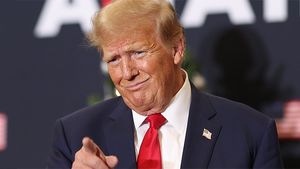Former President Donald Trump recently gathered oil executives and lobbyists at his Mar-a-Lago estate in Florida and made a controversial offer to offer favorable policies in exchange for $1 billion in campaign contributions.
Now it appears the U.S. Senate may launch a formal investigation into the former president.
That's according to The New Republic's Greg Sargent, who spoke with Sen. Sheldon Whitehouse (D-RI) about President Trump's recent plea to the oil industry, saying it's “highly likely” the Senate Budget Committee will investigate the former president's bold overtures.
“I read the article and the word that immediately came to mind was 'quid pro quo,'” Whitehouse said, adding that he was also concerned about a series of proposed executive orders that oil lobbyists are drafting for Trump to sign on his first day in office if he is re-elected in November.
“When you put all of this together it starts to look incredibly corrupt.”
read more: 'Blatant corruption': Critics accuse Trump of 'selling the White House to Big Oil'
Billionaire oil tycoon Harold Hamm organized the event at Mar-a-Lago, which The Washington Post reported was designed to allow the fossil fuel industry to air its concerns about environmental regulations directly to Trump.
During the meeting, Trump reportedly promised an overhaul of President Joe Biden's policies on electric vehicles and wind energy.
“The contrast between the two candidates on climate policy could not be starker. Biden has called global warming an 'existential threat,' and over the past three years his administration has finalized more than 100 new environmental regulations aimed at reducing air pollution and greenhouse gas emissions, limiting toxic chemicals and protecting public lands and waters,” write The Washington Post's Josh Dawsey and Maxine Josselow.
“By contrast, President Trump has called climate change a 'hoax,' and his administration has weakened or repealed more than 125 environmental regulations and policies over four years.”
Whitehouse, the Budget Committee chairman, said Trump's overtures to oil executives were “effectively an invitation for more questions,” adding that he hoped the investigation would uncover the many ways big oil and other industries abuse the campaign finance system and find ways to make it more transparent and accountable.
Noah Bookbinder, president of Citizens for Responsibility and Ethics, an anti-corruption watchdog group in Washington, said while Trump's offer is technically legal, there is still a lot of work to be done to iron out gray areas in federal campaign finance law.
“There is a clear legislative purpose to finding out what happened at this meeting,” Bookbinder told Sargent. “If this is indeed an attempt to tie large amounts of campaign contributions to specific policy commitments, it suggests there is a major loophole that needs to be closed.”
read more: 'Corrupt': Jared Kushner's business dealings come under fire as Trump runs for president
Many of the environmental policies that Trump has signaled he would repeal in a second term are included in the Defeat Inflation Act, a $485 billion bill that Biden could sign into law in 2022 that includes a slew of clean-energy infrastructure initiatives and incentives for electric vehicle development. Economists estimate that the clean-energy development subsidies could generate roughly $1.5 trillion in new economic activity and reduce carbon dioxide emissions by 5 billion tons over the next decade.
Conversely, some of the executive orders the oil industry has prepared for Trump would undermine the progress Biden has made on climate change since taking office. Politico reported that some of the orders would lift Biden's suspension of natural gas export permits, open up new protected federal territory to oil drilling, and allow more leasing for offshore oil drilling.
Trump's positioning of Biden as an enemy of big oil companies is somewhat confusing given that the United States officially reached its highest-ever domestic oil production level earlier this year. The U.S. Energy Information Administration projects that U.S. oil production will average 13 million barrels per day in 2023, making the U.S. the world's largest oil producer.
click here Read Sargent's full essay in The New Republic (subscription required).

